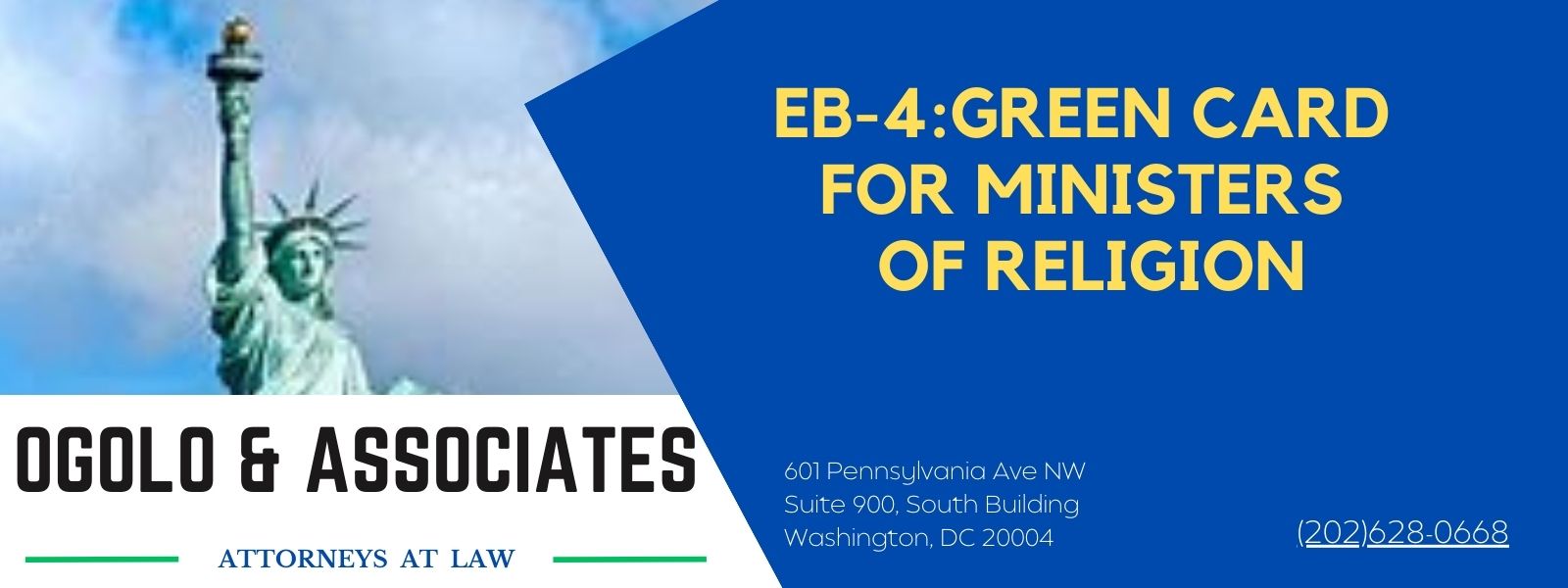The Employment-based immigration, Fourth Preference category, covers special immigrants including Religious workers. The “Religious workers” category covers both ministers and other religious workers who are not ministers. While the provision covering religious workers who are not ministers expires and is subject to renewals by Congress, the provision dealing with ministers is permanent. Those that qualify as ministers can apply for Green Card whether they are present in the United States or abroad.
WHO IS A MINISTER – “Minister” means an individual who:
-
Is fully authorized by a religious denomination, and fully trained according to the denomination’s standards, to conduct worship and perform other duties usually performed by authorized members of the clergy of that denomination;
-
Is not a lay preacher or a person not authorized to perform duties usually performed by clergy;
-
Performs activities with a rational relationship to the religious calling of the minister; and
-
Works or will work solely as a minister in the United States which may include administrative duties incidental to the duties of a minister.
RELIGIOUS DENOMINATION means a religious group or community of believers that is governed or administered under a common type of ecclesiastical government and includes one or more of the following:
-
A recognized common creed or statement of faith shared among the denomination’s members;
-
A common form of worship;
-
A common formal code of doctrine and discipline;
-
Common religious services and ceremonies;
-
Common established places of religious worship or religious congregations; or
-
Comparable indicia of a bona fide religious denomination.
ELIGIBILITY: To qualify as a special immigrant religious worker, the applicant/beneficiary must:
-
Have been a member of a religious denomination that has a bona fide non-profit religious organization in the United States for at least two years immediately before filing a petition on Form I-360;
-
Seeks to enter the United States to work in a full time, compensated position, solely as a minister of a religious denomination;
-
Be coming to work for a bona fide non-profit religious organization in the United States; or
-
A bona fide organization that is affiliated with a religious denomination in the United States
-
Have been working as a minister after the age of 14, continuously for at least two years immediately before the filing of a petition on Form I-360 with the United States Citizenship & Immigration Services;
-
Full time work is an average of 35 hours per week.
-
Compensation may mean salaried or unsalaried.
SUPPORTING DOCUMENTS FROM SPONSORING/PETITIONING ORGANIZATION:
-
Proof of tax-exempt status – the petitioner must provide a current, valid IRS letter of determination of tax-exempt status;
-
If the petitioning organization does not have IRS determination letter of tax-exempt status, it must submit documents or evidence establishing the organization’s religious nature and purpose; such as Articles of incorporation; By-Laws, Flyers, Articles, brochures or other literature that describes the religious purpose and nature of the organization;
-
Proof of Salaried or non-salaried compensation – the organization must submit evidence of how it intends to compensate the religious worker (Minister), including specific monetary or in-kind compensation. Documents such as past evidence of compensation of similar position, budgets showing ability to pay, evidence showing ability to provide room and board to the religious worker, W-2 or certified IRS tax returns.
SUPPORTING DOCUMENTS FROM THE BENEFICIARY – THE MINISTER:
-
Proof of membership – Evidence that the religious worker is a member of the religious denomination having bona fide non-profit religious organization in the United States for at least two years immediately before filing Form I-360;
-
Evidence that the minister has the requisite qualification to perform the duties of that position; such as, certificate of ordination, evidence that the minister satisfied the requirement for the position, evidence that the minister graduated from an accredited theological institution of the denomination;
-
Proof of previous religious work abroad or in the United States, evidence of compensation for previous work, such as tax returns, W-2s.

